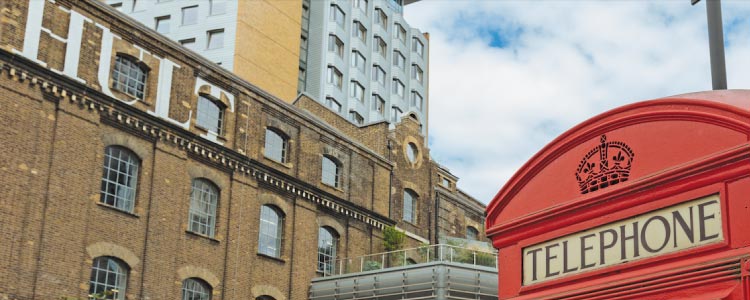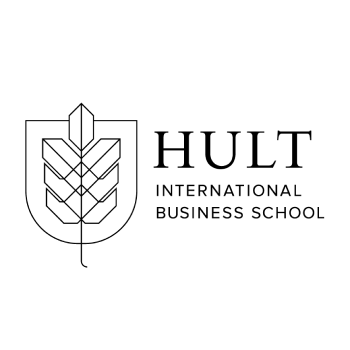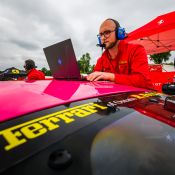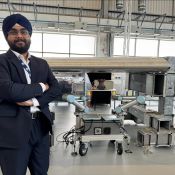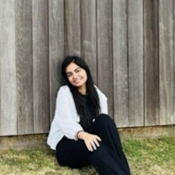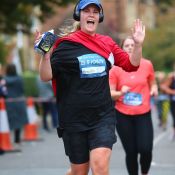
I really enjoyed my program at Oxford Brookes
I applied to study in the Pre-Registration MSc Physiotherapy course at Oxford Brookes University and received my unconditional offer to start the following year. I had applied to physiotherapy programs in Canada, UK and Australia this year and ultimately, receiving the offer to the UK solidified what I already knew – I wanted to study in the UK. I had many reasons to make this decision; I had previously considered doing a working holiday visa in the UK, I had family living in Ireland, I had friends from home and trips I previously taken who lived in the UK and I wanted to be close to mainland Europe to travel.
I used Across the Pond to apply to the UK both times I applied to study. I previously had an offer to Brunel University but wasn’t able to accept at the time for other circumstances. Both times applying, I had advisors who helped me start the application, guide me on writing personal statements, getting the right paperwork and answering all of the millions of questions I had. I have recommended them to all my friends who have at any point considered studying in the UK, because it made my life so much less stressful!
Finding Home Away from Home
When I moved to Oxford, I had found accommodation online a few months ahead of time. I chose not to stay in the university accommodations because I felt as a ‘mature’ student, I didn’t want to live in the residences and be distracted by potential younger students who were also wanting to have more fun. I had ‘been there, done that’ and I knew I wanted more comfort. I found a house share with 5 strangers, who all happened to be PhD students or Post-Docs at Oxford University and I was very lucky that we all were roughly the same age, and all from different countries – China, Italy, Belgium, and India. In the two years we lived together, we became close friends and I’m happy to say 2 years after moving out, we are all still in touch although we have moved separate ways. They became my family away from home, we cooked and shared meals together, celebrated our highs and supported each other’s lows together. I’m grateful to have met them.
In Oxford, it never seemed to be an issue to find a room or a house for rent. There is the peak season of doing so, I heard from friends that if you were looking to move into a house together, you had to plan ahead in advance, as often you’d sign the agreement 2-3 months prior to moving in! I would recommend generally viewing a place before moving in, I got super lucky not viewing the house, however, I was able to speak with my housemate on the phone ahead of time to get an idea of the vibe. I managed to snag the largest room in the house; I had my own en-suite because I knew I didn’t want to be sharing a bathroom with anyone or potentially cleaning up after people when their cleanliness standards didn’t meet mine (certified germ freak!). I think the price I paid was on the higher end of what you could find, but given the people I lived with and the proximity to campus, I was fine to pay this and had budgeted ahead of time to account for this. You’ll find a lot old houses in the UK, so be prepared for drafty windows and creaky floors, hopefully avoiding any leaky rooks or unwanted rodents (both I heard through friends).
I was super lucky when I signed my house share agreement, I didn’t realise I would be a 10-minute walk to campus! I lived in the residential area of Marston, a 20-minute walk to the John Radcliffe hospital, 45-minute walk to the Churchill Hospital or 30-minute walk into the high street and train station. I had classmates who drove or took the train in, others lived within Oxford in areas such as Headington or Cowley. Jericho is a touch farther, but still easily commutable. Most people in Oxford have a bike, this makes getting around so much easier! I think my life changed for the better once I secured a bike at the end of my 1st year, my house mate sold it to me since he decided to get a car instead for his own leisurely activities. Having a bike made nights out easier but also getting to campus, grocery shopping and placements. I would DEFINITELY recommend, and you don’t need anything fancy because they do get stolen sometimes, so just get a bike that works and a good lock!
Working in Oxford
I had to work to support myself while studying abroad, and I was really fortunate to get a part time job at the Up in Arms Pub in Marston, right across campus and a short walk from my house. I enjoyed working here; it was something I had never done and I now get to say I worked in a pub in the UK! How iconic! The team was supportive, fun and a great way to switch off. I got to know the regulars who would come in and create relationships with the people in the local community alongside other students who studied in Oxford. I also worked with a local events company and this was flexible, so I worked it around my pub job, classes, studying and placements. I was able to see the inside of the Sheldonian Theatre while working graduations or concerts, I worked weddings and events in The Divinity School (big moment for my inner Harry Potter nerd) to name a few things I did.
The ACTUAL Physiotherapy program
I really enjoyed my program at Oxford Brookes, I felt like we had a close-knit group of 20 students in my year. 6 of us were Canadian which was really nice, I remember within those first few weeks we celebrated Canadian Thanksgiving together and the following year we had everyone on the course join us for Thanksgiving. Professors were engaging and helpful and clearly enjoyed teaching and most of them still had clinical roles in their specialities. They were available for additional support as we needed and took our preferences on board when asking for placements. I was quite lucky again, in that, 4 of 5 placements were local in Oxford, only 1 was a distance away but 3 of us were placed there and one of them had a car so we were able to carpool together. We had the opportunity to apply to support the local rugby team as student physiotherapists to develop our clinical skills in a more professional setting where we weren’t getting graded like our placements. We had the options to do lots of group work and self-directed study to learn independently. If we needed to book facilities to practice our skills in the lab, this was also available.
The course offered students a chance to go on a sports massage course or Pilates course, not covered financially, so you’d have to self-fund, but you could then use those skills to work for yourself or a clinic to further your experience and confidence. I heard good reviews from both from classmates that attended.
Exploring the UK
I chose Oxford, because it’s an iconic location in the UK on its own but also its proximity and closeness to everything else you’d want to explore.
In my first year, the university offered weekend day trips organised for a small fee to different locations around the country. I went to Cardiff, Stratford Upon Avon, Isle of Wight and Cambridge. London is a quick train ride or you can take the Oxford Tube which runs all night and is particularly helpful during any cancelled trains.
I had friends in London, Canterbury and York who I caught up with. When I met by boyfriend, he took me to Suffolk where he was from and I got to see a different side of the country. My sister lives in Ireland, I was able to get cheap flights over from Birmingham Airport to see her and when she got married, she chose Portugal for a destination wedding, so was able to go visit beforehand. My friends came to visit from Canada and we went to Hungary and Germany and attended Oktoberfest, what a fun event and we can’t wait to go back in the future.
I’ve now moved to Kent since graduation and working in the NHS as a physiotherapist and not having to study every weekend, means I’ve been able to explore more. My boyfriend and I have been to Bath, Norfolk Broads, and Dover to name a few spots. We visit friends in London, Oxford, Winchester as hangouts arise. We’re hoping to make our way to Scotland and Devon in the next year and explore different parts of England.
- Henrietta

Safety first: How Cranfield's Safety in Human Factors MSc is shaping my future in aviation
Hello! I'm Maty an Italian originally from Senegal, and I recently embarked on the exciting journey of an MSc in Safety and Human Factors in Aviation at Cranfield University. Choosing where to study is a monumental decision, but for me, the choice was crystal clear: I needed a university that didn't just talk about the industry - it was part of it.
Why Cranfield? Finding the perfect balance
I knew Cranfield University had a distinct and well-deserved reputation for its strong ties to industry, especially within the aviation and aerospace sectors. I wasn't just looking for technical knowledge; I sought a course that perfectly integrated demanding academic instruction with human-centred approaches to safety.
The MSc in Safety and Human Factors was the ideal fit for me, offering a curriculum packed with real-world applications directly transferable to an aviation career.
A huge part of Cranfield's unique selling point is something truly unparalleled: Cranfield is the only university in the UK with its own operational airport, runway, and air traffic control on campus. This isn't just a fun fact - it's the foundation of the Cranfield experience. It meant that my "classroom" often extended right to the tarmac, allowing for unparalleled, hands-on learning and research that immediately reflects current aviation safety concerns.
The thrill of real-world learning
My time on the course has been both rewarding and challenging. The highlight has definitely been working on projects that mirrored real-world aviation safety concerns. Learning from instructors who possess a wealth of professional industry experience was invaluable; they weren't just teaching theory; they were sharing insights forged in active careers.
Furthermore, collaborating with peers from various professional and cultural backgrounds made every project a truly global exercise - excellent preparation for the multicultural, multidisciplinary teams that are standard in international aviation.
A typical day on campus was always concentrated yet vibrant: it began with lectures, then moved into intense project work or group discussions. The afternoons were frequently spent in the library or during practical sessions. The focused yet friendly close-knit campus community made it simple to strike a balance between social life and academics.
Shaping aspirations and building confidence
Cranfield's deep emphasis on industry collaboration and applied research profoundly influenced my career goals. It wasn't just about gaining knowledge; it was about demonstrating how that knowledge can directly and immediately enhance aviation safety.
The course prepared me by sharpening my ability to think critically, teaching me how to assess intricate safety systems from a human-centred standpoint, and giving me the self-assurance to present complex solutions to both technical and non-technical audiences. This motivated me to seek out leadership positions in human factors research, safety management, or consulting, where I can have a real, tangible influence on operational effectiveness.
My ultimate goal is to keep developing in this vital field, supporting initiatives that increase operational safety, and assuming leadership roles where I can mentor the upcoming generation of industry professionals and impact policy.
My advice to future students
Studying at Cranfield University has been intellectually and culturally rewarding. I valued the friendly and encouraging staff, and the university's emphasis on practical results truly sets it apart. The international community here made it simple to share ideas and gain knowledge from various viewpoints.
“My advice to you is simple: I urge you to be proactive and make the most of Cranfield's abundant resources and unique networking opportunities. Make sure to interact with your peers, as teamwork is one of the most beneficial features of the course - those relationships will last a lifetime. Finally, strike a vital balance between your studies and personal development, because the relationships and experiences you make will be just as valuable as your degree.”
- Maty
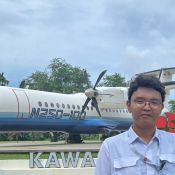
Propelling Innovation: How Cranfield's Advanced Lightweight and Composites Structures MSc launched my aerospace research career
From the classroom at Cranfield University to a national research centre in Indonesia, my journey through the MSc in Advanced Lightweight and Composite Structures (ALCS) has been a testament to the power of industry-focused, hands-on engineering education. I'm Ilham Akbar, an Indonesian national, a graduate, and now a Researcher at the Research Centre for Aeronautics Technology – National Research and Innovation Agency (BRIN). My time at Cranfield turned a passion for aerospace into a high-impact research career.
Why I Chose Cranfield: A foundation built on industry collaboration
Choosing to study at Cranfield University was an easy decision for me. I’d heard about its global reputation for close industry collaboration and its hands-on, engineering-driven approach since my undergraduate studies in Aerospace Engineering. The ALCS course, specifically, was a perfect match for my long-term goal of advancing composite technologies for aerospace applications.
Studying abroad had always been one of my biggest dreams, not only because I have a deep love for football and the unique atmosphere of the UK, but mainly because of my ambition to study aerospace engineering at a world-class university. I was fortunate to receive a scholarship from the Indonesia Endowment Fund for Education Agency (LPDP), which allowed me to pursue this goal through the MSc in Advanced Lightweight and Composite Structures at Cranfield University.
I was particularly attracted by the integration of theoretical knowledge, numerical modelling, and real-world problem-solving through projects with direct industrial relevance.
The course itself was intellectually challenging and deeply insightful. My lecturers' expertise and industry experience elevated every discussion, strengthening both my technical foundation and my confidence to contribute to advanced research in aerospace composites.
Real-world readiness: from airbus project leader to researcher
The ALCS MSc is brilliantly structured to prepare you for the demands of the real world through three key experiences:
- Class and technical sessions: These sessions, ending with exams or reports, strengthened my core technical foundation in lightweight and composite structures.
- The group project: This was definitely a highlight! I had the opportunity to serve as the team leader for a project provided by Airbus. We were challenged to analyse and propose engineering solutions based on a real industrial need. It gave us the chance to apply what we learned to a practical, high-level aerospace problem, under the guidance of both Cranfield academics and Airbus experts.
- The individual research project (thesis): This allowed me to delve deep into a specific engineering problem, combining manufacturing, testing, and simulation in Cranfield’s excellent research facilities. Supported by a diverse team of professional supervisors, this experience was invaluable in shaping my current research approach: integrating design, experimentation, and numerical analysis.
The course prepared me not only in technical competence but also in leadership, teamwork, and analytical problem-solving—all essential skills for my current engineering and research environment. I was also honoured to receive The Course Director’s Prize for Outstanding Overall Performance and The Course Director’s Prize for Best Individual Thesis during my time at Cranfield.
Future forward: integrating smart technology
Cranfield's focus on smart materials, embedded sensors, and intelligent manufacturing directly impacted my career goals. My thesis project was a prime example, teaching me how to connect theory with practical engineering, from material fabrication to performance validation.
Today, as a researcher at BRIN, I focus on the development, analysis, and optimisation of composite structures for various aerospace applications. My day-to-day work involves manufacturing, testing, and simulation - a dynamic environment that is a direct continuation of the skills I honed at Cranfield.
My ultimate aspiration is to establish a research collaboration between BRIN and Cranfield University. I sincerely believe that partnership and knowledge exchange are key to accelerating progress in advanced composites, intelligent manufacturing, and digital design.
My top advice for prospective students
If you are considering a career in advanced lightweight and composite structures, my most critical advice is this:
- Be genuinely curious: Take full advantage of the opportunity to gain in-depth and hands-on knowledge. Curiosity is the bridge that connects theoretical knowledge with real engineering understanding.
- Embrace the trio: Dive deep into the interaction between manufacturing, testing, and simulation. Understanding this complete lifecycle - how a structure is made, how its performance is verified, and how it can be modelled - is the foundation of a proper engineering mindset.
- Master communication: Cranfield trains you to produce high-quality reports and papers. It's not enough to analyse data; you must be able to organise, visualise, and convey it clearly. Combining solid technical work with effective communication is what truly transforms good research into impactful research.
-Ilham Akbar

From Kenya to Cranfield: building the future of responsible AI
The world of technology is moving at an unprecedented pace, and at the heart of this revolution is Cranfield University. Cranfield is at the forefront of new technology and builds strong links with global companies, so let’s hear the story of one student who is redefining his trajectory on our campus.
Meet Dennis, a Kenyan national and UK resident, currently pursuing an MSc in Applied Artificial Intelligence at Cranfield, with an expected graduation in June. His journey is a powerful testament to the impact of industry-led, applied education.
Why Cranfield? It’s all about the application
For Dennis, the choice was clear:
"I wanted a programme that went beyond theory and gave me opportunities to build and deploy AI solutions in realistic environments."
He chose Cranfield specifically for its reputation for industry-led teaching, applied research, and close collaboration with real-world partners. The Applied AI MSc was a perfect match, aligning with his professional focus on responsible AI (RAI), automation, and AI governance. A significant draw was the structure of the course, particularly the Group Design Project, which he notes "mirrors how AI projects are delivered in industry and demands technical depth, leadership, and collaboration”.
The intense, rewarding reality of applied AI
The course, in his words, is "intense in the best and most rewarding way." The highlight? The Group Design Project, which felt like running a real-life consultancy sprint -fast-paced, deeply technical, and highly collaborative. This project-based learning challenged his team to translate complex requirements into deployable AI solutions under tight deadlines, sharpening both his technical depth and leadership abilities.
Cranfield has given Dennis the opportunity to bridge the gap between academia and industry. It has allowed Dennis to obtain:
-
Hands-on innovation: developing an AI orchestration pipeline leveraging LLMs (Llarge language models), ensuring every module translates directly into a real-world capability.
-
Industry insights: impactful workshops, such as a session led by a senior data leader from Jaguar Land Rover, exploring how AI operates at scale within engineering and manufacturing ecosystems.
-
Deep technical foundations: modules like Intelligent Cyber-Physical Systems offer a solid understanding of how AI integrates with autonomous environments and IoT systems, directly feeding into the work of his startup, Prescott Data.
-
Global collaboration: working with peers from diverse nationalities and professional backgrounds, a collaboration so fruitful that the group even went a step further to publish two research papers.
"Overall, the course combined intensity, innovation, teamwork, and industry relevance in a way that has prepared me exceptionally well for the next phase of my AI career."
Leading the charge in responsible AI
Cranfield’s emphasis on smart technology isn’t just preparing Dennis; it is inspiring him. The programme has powerfully reinforced his belief that smart technology must be both powerful and trustworthy.
This focus has strengthened his aspiration to lead large-scale, impact-driven AI programmes globally, particularly in healthcare, development, and digital transformation. It directly informs his role as co-founder at Prescott Data, where he leads the development of Dromos, an AI-native agent builder designed to automate mission-critical workflows.
The course goes beyond algorithms, providing practical experience in AI operations lifecycles, reproducibility, observability, compliance, and AI risk management - all crucial real-world challenges.
"I aim to become a global leader in responsible AI, automation, and AI governance... and build frameworks that improve trust, adoption, and impact."
The Cranfield campus: focus, movement, and calm
What does life look like on a leading smart campus? For Dennis, a typical day is a blend of "focus, movement, and calm."
Days are structured around engaging lectures and lab-based sessions, followed by collaborative group work or research. But the unique campus environment offers space to think deeply: the environment itself has its own rhythm - walking the wood trail, grabbing fresh air near the airport strip, or spending time at the campus gym to reset. There’s a calming energy at Cranfield that allows you to think deeply without distraction.
This supportive and intimate learning environment, combined with world-class faculty and industry access, has made his experience of studying in the UK transformative.
Your future starts here: advice for the next generation
For anyone interested in smart technology, Dennis offers crucial advice:
"My advice is to embrace both the technical and ethical dimensions of smart technology. The future of AI and smart systems depends not just on advanced algorithms but also on ensuring transparency, fairness, and accountability."
He urges future students to "Be curious, stay hands-on, and build a strong foundation in both the technical tools and governance frameworks. Most importantly, think about how your work will create real-world impact."
- Dennis

Powering the future: why Cranfield's gas turbine programme is the ultimate launchpad
If your dream job involves engines that define aerospace travel, or industrial systems that power global energy, then you need more than just a degree - you need a launchpad. That’s exactly what I found at Cranfield University, an institution built on postgraduate excellence and relentless industry focus.
I completed my MSc in Thermal Power and Propulsion, Rotating Machinery, Equipment, and Management in February. My experience here was so rewarding, I decided to stay on for a PhD! Here is why Cranfield is the essential next step for your career in turbomachinery.
The passion for propulsion: why I chose Cranfield
During my studies and internships at industry giants like GE Aerospace and Baker Hughes, I discovered my true calling: gas turbine engineering. This field perfectly combined all the subjects I enjoyed most - heat transfer, fluid mechanics, turbomachinery, combustion, and thermodynamics - and offered a career that spanned both aerospace and industrial applications.
“Cranfield University was the obvious choice because it offered a unique opportunity to deepen my knowledge of gas turbines across this full spectrum. It perfectly aligned with my goal to build a comprehensive, dual-application professional profile.”
Beyond theory: developing a real engineering mindset
The course was demanding yet highly rewarding. It provided a rock-solid foundation in how gas turbine engines operate, but the most valuable takeaway was the engineering mindset it cultivated.
As my professors emphasised, the design of a turbine must always depend on its intended application. The objectives for an industrial turbine are drastically different from those for an aerospace turbine. This critical approach - always considering the expected outcomes and functional purpose of the system - is the core of engineering at Cranfield.
Another key highlight was the intense industrial relevance. Lectures delivered by professionals actively involved in specific technologies and engine development gave us a unique understanding of how theoretical knowledge is applied to solve real-world industrial problems that generate value for a company.
The power of smart technology - and critical thinking
Cranfield’s emphasis on smart technology taught me the immense value of modern design tools. In many cases, running a mathematical model is far more cost-effective than conducting a full-scale experiment. We learned how approaches like using a digital twin of an engine can greatly enhance performance monitoring and maintenance planning.
However, the most valuable lesson was critical awareness. No model can perfectly capture the complexity of the real world. As future engineers, we must always evaluate results critically.
"No paper or model can perfectly capture the complexity of the real world and this is something that should always be kept in mind. This critical awareness is one of the most valuable lessons to take away from your time at Cranfield."
Preparation for the real world: cutting-edge research
The preparation for real-world engineering is excellent. The majority of our individual research projects - which serve as the thesis - are highly relevant to current industry challenges. We engage with areas that closely reflect the technological directions and research priorities currently pursued by industry, such as:
- The use of alternative fuels.
- Prognostics and diagnostics (predicting and diagnosing engine issues).
- The integration of bottoming cycles with supercritical CO2 for efficiency.
This opportunity to work on industrial research is what makes Cranfield graduates highly attractive in the job market. The programme ensures you can not only model complex systems but also understand the limitations of those models and how accurately they represent real physical phenomena.
A campus where academics become mentors
What truly sets Cranfield apart is the environment - the people and the culture. My decision to stay and pursue a PhD reflects how much I enjoy this place. The course is not only well-structured and academically rigorous but also provides unique, industry-relevant knowledge.
The energy and enthusiasm here are special. The academics are more like colleagues and mentors than distant lecturers. I’ve found that you can always approach them with any questions or difficulties, and if they can’t provide the answer, they will readily direct you to someone who can help.
Your path to propulsion: my advice
If you are interested in thermal power and propulsion, take full advantage of this programme. Whether I end up in academia or industry, I know I will continue working in gas turbine engineering, and Cranfield made that certainty possible.
My advice to you is simple: always evaluate your results critically.
Before you begin any detailed modelling or computational work, perform simple manual calculations to verify whether your results are reasonable. This critical thinking -understanding the physical limits before trusting the digital ones - is the hallmark of a great Cranfield engineer.
- Krzysztof
